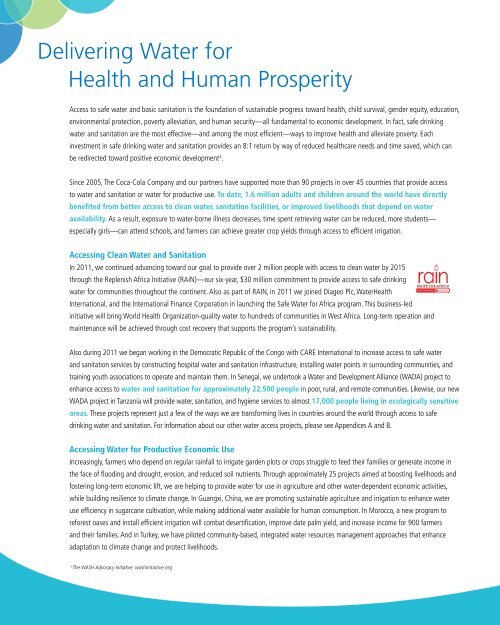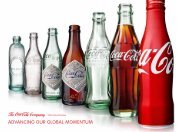Water Stewardship and Replenish Report - Psddev.com
Water Stewardship and Replenish Report - Psddev.com
Water Stewardship and Replenish Report - Psddev.com
Create successful ePaper yourself
Turn your PDF publications into a flip-book with our unique Google optimized e-Paper software.
Delivering <strong>Water</strong> for<br />
Health <strong>and</strong> Human Prosperity<br />
Access to safe water <strong>and</strong> basic sanitation is the foundation of sustainable progress toward health, child survival, gender equity, education,<br />
environmental protection, poverty alleviation, <strong>and</strong> human security—all fundamental to economic development. In fact, safe drinking<br />
water <strong>and</strong> sanitation are the most effective—<strong>and</strong> among the most efficient—ways to improve health <strong>and</strong> alleviate poverty. Each<br />
investment in safe drinking water <strong>and</strong> sanitation provides an 8:1 return by way of reduced healthcare needs <strong>and</strong> time saved, which can<br />
be redirected toward positive economic development3 .<br />
Since 2005, The Coca-Cola Company <strong>and</strong> our partners have supported more than 90 projects in over 45 countries that provide access<br />
to water <strong>and</strong> sanitation or water for productive use. To date, 1.6 million adults <strong>and</strong> children around the world have directly<br />
benefited from better access to clean water, sanitation facilities, or improved livelihoods that depend on water<br />
availability. As a result, exposure to water-borne illness decreases, time spent retrieving water can be reduced, more students—<br />
especially girls—can attend schools, <strong>and</strong> farmers can achieve greater crop yields through access to efficient irrigation.<br />
Accessing Clean <strong>Water</strong> <strong>and</strong> Sanitation<br />
In 2011, we continued advancing toward our goal to provide over 2 million people with access to clean water by 2015<br />
through the <strong>Replenish</strong> Africa Initiative (RAIN)—our six-year, $30 million <strong>com</strong>mitment to provide access to safe drinking<br />
water for <strong>com</strong>munities throughout the continent. Also as part of RAIN, in 2011 we joined Diageo Plc, <strong>Water</strong>Health<br />
International, <strong>and</strong> the International Finance Corporation in launching the Safe <strong>Water</strong> for Africa program. This business-led<br />
initiative will bring World Health Organization-quality water to hundreds of <strong>com</strong>munities in West Africa. Long-term operation <strong>and</strong><br />
maintenance will be achieved through cost recovery that supports the program’s sustainability.<br />
Also during 2011 we began working in the Democratic Republic of the Congo with CARE International to increase access to safe water<br />
<strong>and</strong> sanitation services by constructing hospital water <strong>and</strong> sanitation infrastructure, installing water points in surrounding <strong>com</strong>munities, <strong>and</strong><br />
training youth associations to operate <strong>and</strong> maintain them. In Senegal, we undertook a <strong>Water</strong> <strong>and</strong> Development Alliance (WADA) project to<br />
enhance access to water <strong>and</strong> sanitation for approximately 22,500 people in poor, rural, <strong>and</strong> remote <strong>com</strong>munities. Likewise, our new<br />
WADA project in Tanzania will provide water, sanitation, <strong>and</strong> hygiene services to almost 17,000 people living in ecologically sensitive<br />
areas. These projects represent just a few of the ways we are transforming lives in countries around the world through access to safe<br />
drinking water <strong>and</strong> sanitation. For information about our other water access projects, please see Appendices A <strong>and</strong> B.<br />
Accessing <strong>Water</strong> for Productive economic Use<br />
Increasingly, farmers who depend on regular rainfall to irrigate garden plots or crops struggle to feed their families or generate in<strong>com</strong>e in<br />
the face of flooding <strong>and</strong> drought, erosion, <strong>and</strong> reduced soil nutrients. Through approximately 25 projects aimed at boosting livelihoods <strong>and</strong><br />
fostering long-term economic lift, we are helping to provide water for use in agriculture <strong>and</strong> other water-dependent economic activities,<br />
while building resilience to climate change. In Guangxi, China, we are promoting sustainable agriculture <strong>and</strong> irrigation to enhance water<br />
use efficiency in sugarcane cultivation, while making additional water available for human consumption. In Morocco, a new program to<br />
reforest oases <strong>and</strong> install efficient irrigation will <strong>com</strong>bat desertification, improve date palm yield, <strong>and</strong> increase in<strong>com</strong>e for 900 farmers<br />
<strong>and</strong> their families. And in Turkey, we have piloted <strong>com</strong>munity-based, integrated water resources management approaches that enhance<br />
adaptation to climate change <strong>and</strong> protect livelihoods.<br />
3 The WASH Advocacy Initiative: washinitiative.org




